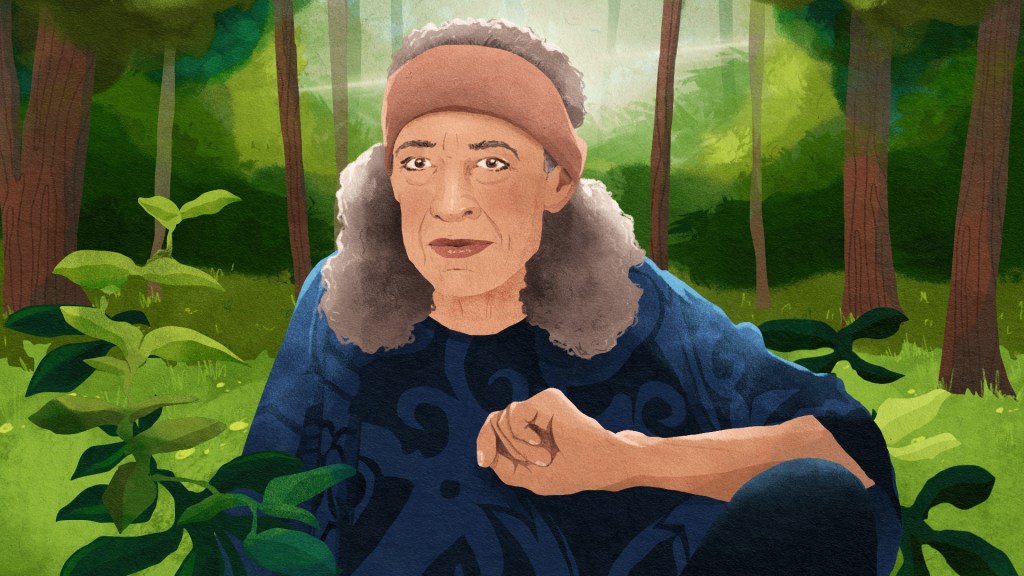In her life, Zooey Zachow has transitioned to female, served in the army during Don’t Ask Don’t Tell, battled PTSD, and come out of the closet to her evangelical parents. This year, she is starting her next journey: opening a legal weed farm in Goldendale, Washington. “It’s an outdoor sustainable cannabis farm,” she says.
For the past two years, Zachow and her boyfriend, Michael Buchert, have been building the farm while Zachow has lived in a tent on the property. She grew up in a much more traditional household: Her father worked as a pastor in an “evangelical non-denominational megachurch,” she says. Throughout school, Zachow struggled because of a learning disability. In 2007, at the end of high school, Zachow was also still processing her gender identity. She wanted to attend art school, but her student loan fell through, so she decided to join the army. She thought she would work as a “military photographer.” She was also unaware of DADT. “I didn’t fully understand that [law],” she says. The military deployed her to Iraq.
Videos by VICE
When Zachow returned to Washington in 2009, she says she was suffering from post-traumatic stress disorder (PTSD). “I was pretty unemployable,” she says. She hated her PTSD medication because of the side effects, and after she learned at a PTSD support group that some veterans believe weed helps curb PTSD, she decided to try pot. From then on, she worshiped the plant. “It provided me better symptom relief with less side effects,” Zachow says. (Citing controlled studies, the United States Department of Veteran’s Affairs has questioned the safety and effectiveness of using marijuana to treat PTSD. The VA believes there is currently no proof that weed relieves PTSD symptoms.)
But Zachow saw her life improve immediately. “[Weed] saved my life,” she says. “I absolutely wouldn’t have survived the years [after the army] without cannabis.” Because of her religious upbringing, she feared telling her mom about her new friend. One day, she sat her mom down to tell her she was coming out of the “cannabis closet.” Zachow says her mom started crying. “Whatever you’re doing, it works,” Zachow recalls her mom saying. She had seen pot calm Zachow, and she was happy she had found something to help treat the PTSD.
Weed also helped Zachow go through her gender and sexual awakening. “Cannabis is a countercultural thing,” she says. First, she came out as bisexual. She struggled to afford cannabis, so she started volunteering at dispensaries to get the drug for free. But she hated the “cis white men” who ran the businesses. “They didn’t show the plant respect,” she says.
In 2011, Zachow decided to open a medical dispensary with a few friends. The following year, Washington passed legal recreational use of marijuana. The new law sent the dispensary into disarray. “We all had different visions for how to proceed into the recreational [economy],” Zachow says. Around the same time, she came out as trans, and she says her business partners struggled to accept her.
Two years ago, Zachow parted ways from her business and called her ex-boyfriend Buchert. She told him she didn’t have a place to live and wanted to open a weed farm. Would he join her? Buchert said yes. Zachow moved in, and they got land in Goldendale. “This set us on this two-year journey to get the farm off the ground,” Buchert says. They named their company Ritual Cannabis and referred to the property as Ritual Ground, because they seed weed as a ritualistic drug. “You have to kill the male [part of the plant]. It will be an important ritual when we kill the male,” Zachow says.
For the first couple of months, Zachow lived on the property in a tent. As a business, the pair hoped to reinvent the weed farm the same way Cirque Du Soleil reinvented the circus. Buchert hates how “rich white people” have told “the cannabis story”; he believes Ritual Cannabis would make weed queer again.
“We are queer folk,” Buchert says. “We can’t be a cannabis brand and not acknowledge that cannabis is a very political issue.”
The farm is still in the early stages. Along with growing weed, they plan to host workshops and retreats at the farm. They have promised to invest their profits into workshops about “anti-violence, anti-oppression, and anti-racist work” aimed at Washington state residents who have probably heard about these issues. “It will bring the urban and rural experience,” Zachow says. Visitors will smoke, practice yoga, and meditate. “We make art. We move,” Buchert says. “Cannabis is a tool to get free.”
“Cannabis is a social justice issue for us,” Zachow says.



